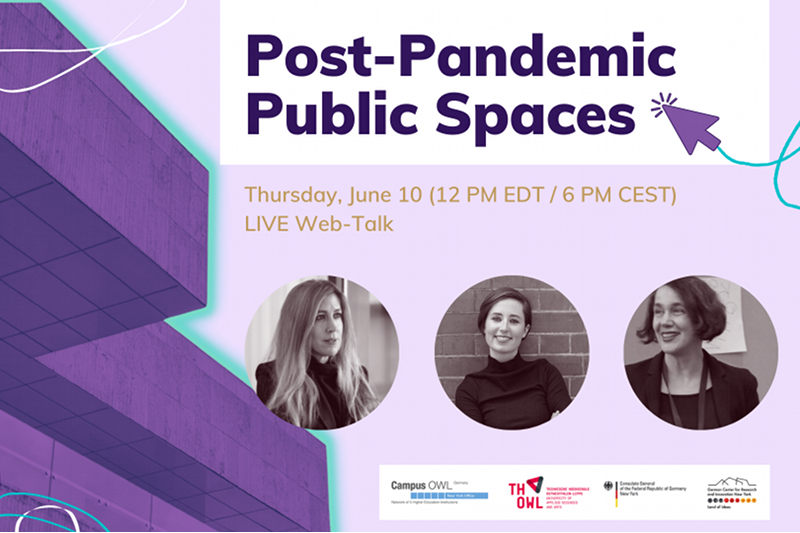
08 Dez Live Web Talk: Post-Pandemic Public Spaces
Event
Live Web Talk: Post-Pandemic Public Spaces
Location: Online
See the recording on You Tube.
Campus OWL New York office is teaming up with the DWIH New York to feature Prof. Elizabeth Sikiaridi from OWL University of Applied Sciences and Arts as well as Dr. Harriet Harriss from the Pratt Institute in Brooklyn and Dr. Mona Sloane from NYU.
COVID-19 and the many measures to control its spread have fundamentally changed the way urban residents think of their cities and public spaces. Streets and squares once designated for cars now belong to pedestrians and restaurants; access to nature, open spaces and sports and leisure facilities has emerged as a vital need. Meanwhile digital interaction and socialization has rapidly accelerated, fueled by video calls, gaming, streaming and e-commerce.
The pandemic has highlighted the importance of our local environment and accelerated emerging trends towards a healthier, more inclusive and active city, essential to inhabitants’ physical and psychological well-being.
Join us Thursday, June 10 at 12 PM EDT for a conversation on future design, use and perceptions of public space.
The crisis induced by the pandemic has quickened and fueled several diverging trends:
Digitalization is speeding up, with a plethora of services, products, and experiences shifting to the virtual realm. Social interactions are increasingly relying on, developing, and unfolding in the digital sphere as well, at once shaping and being shaped by digitalization.
More folks are using parks and public spaces such as streets and squares for walks, bike-rides, play and socializing, as well as cultural activities. On the other hand, we are witnessing urban flights as urban population move towards suburban homes and living, with private gardens or in the comfort and safety of purposeful, intentional communities in co-housing or co-living arrangements.
Even as globalization progresses, the future looks more and more locally bound and organized, with more energy and resources pouring in the revitalization of neighborhood- and city-based social, cultural, and economic ties. Any notion of the future of public spaces must account for both digital public space and physical urban spaces, for their blurring, mutual influence, and interaction.
Public urban space and its potential for accidental, fortuitous contacts allows us to meet each other and to learn from one another, breaking through the “bubbles” and echo-chambers of highly personalized, tailormade digital existences. Truly inclusive public spaces contrast to encroaching gentrification and have the capacity to welcome people with radically different backgrounds, offering the chance to grow and cherish a sense of belonging.
Explore the changes in public (physical and digital) spaces that will last in the post-COVID19 times and how can we influence developments together with us.
Our Experts:
Dr. Harriet Harriss, Pratt School of Architecture
Prof. Elizabeth Sikiaridi, TH OWL (OWL University of Applied Sciences and Arts)
Dr. Mona Sloane, NYU’s Institute for Public Knowledge
With Welcome Remarks by:
Yasemin Pamuk, Head of Cultural Affairs and Science, German Consulate General New York
Dr. Katja Simons, Executive Director, Campus OWL New York Office
Moderated by:
Dr. Kathrin DiPaola, Program Manager, DWIH New York
See the event website here for the registration link

